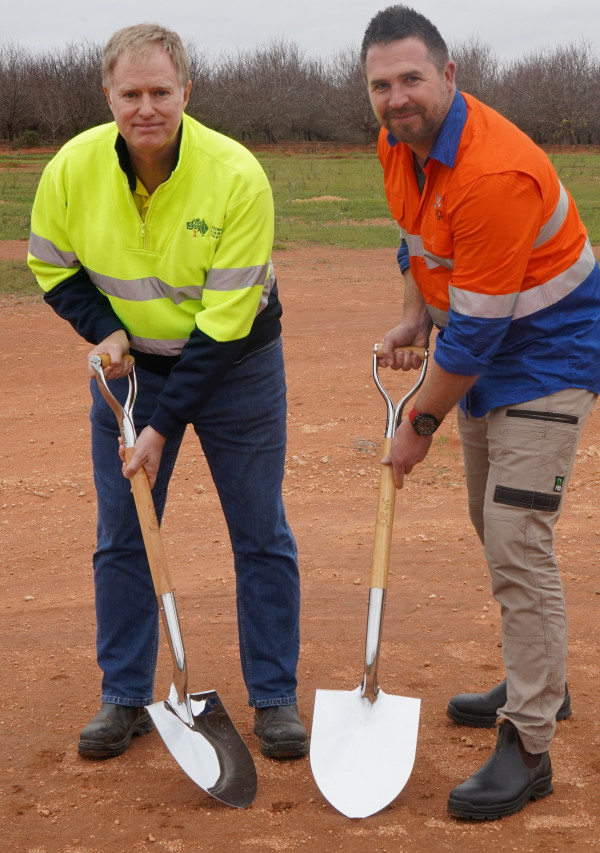AUSTRALIAN Farming Services (AFS) might be growing lots of almonds, but it’s also harvesting the sun to drive operations at its Cadell and Canally orchards, along with its processing facility at Murray Downs.
At Cadell Orchards, AGL has constructed a 4.9-megawatt solar farm, a 5.4-megawatt-per-hour battery system, 7km of new underground powerlines, an inverter, a grid stability unit and microgrid controller, and communications.
Now supplied with enough renewable energy to power a small town, this new solar farm is the size of two MCGs and will help Cadell Orchards cut thousands of tonnes of CO2 emissions each year.
AGL is also working with AFS on two further microgrid projects at its Canally almond orchard and Murray Downs pocessing facility, with both projects aiming to reduce reliance on diesel, harness renewable energy sources and provide energy resilience and reliability to the businesses.
With Cadell Orchards and Canally Orchards currently relying on 100 per cent diesel generation to power their irrigation, the onsite microgrids will reduce this reliance on diesel by 85 per cent, slashing the orchards’ combined Scope 1 CO2-e emissions by 10,900 tonnes – the equivalent of taking 3027 cars off the road.
AGL chief customer officer Jo Egan says the expansion of the partnership to include Canally and Murray Downs demonstrates that AGL offers commercial and industrial customers innovative and cost-effective renewable energy solutions.
Ms Egan says AGL has been working with AFS “to model energy usage and design an integrated and innovative renewable energy system to lower costs and meet future needs across the three sites”.
“We are excited to support AFS achieve its sustainability goals and work together to complete three large renewable energy projects in the Riverina community,” she says.
“Our partnership is testament to partnering with businesses to provide tailored energy solutions and support our customers to decarbonise the way they live, move and work.”
AFS chief executive David Armstrong says with AGL’s support the agribusinesses are transforming their farming operations to generate clean and renewable solar power, providing greater energy resilience for the remote area.
“We manage more than 4400ha and nearly 1.5 million trees in some of Australia’s most productive horticultural regions,” Mr Armstrong says.
“We are working closely with AGL as it designs, builds and operates the solar-powered microgrid at Cadell Orchards and Canally Orchards and delivers the almond farms an 85 per cent reduction in diesel fuel, slashing our emissions and providing substantial cost savings each year.
“As one of the largest employers in the region, these renewable energy projects provide our businesses with greater energy price certainty and better energy reliability so we can focus on producing Australian-grown almonds.”
Project scope
Cadell Orchards
AGL has completed construction at Cadell Orchards of a 4.9MW tracking solar farm, a 5.4MWh battery system, 7km of new underground powerlines, an inverter, a grid stability unit and microgrid controller and communications.
Cadell Orchards is a 1690ha almond orchard that is not connected to the energy grid owing to its location and is irrigated with electric pumps currently powered by diesel generators.
AGL has built, owns and operates the solar-powered microgrid under a long-term power purchase agreement, providing most of Cadell’s electricity needs and reducing its reliance on diesel fuel by 85 per cent and delivering up to 40 per cent of energy savings each year.
Canally Orchards
AGL will construct a microgrid at the 2500ha Canally almond orchard comprising a 6.5MWpDC solar array and a 5.1MWh battery storage system.
As part of the project, AGL will build powerlines underground to connect the solar array with Canally’s irrigation pumping stations.
The microgrid will deliver an 85 per cent reduction in diesel usage and a reduction of 7000 tonnes in Canally’s Scope 1 annual CO2 emissions over the 20-year tenure of the power purchase agreement.
AGL will also explore using the excess solar energy to power agricultural vehicles and trucks transporting products to the Murray Downs Processing Facility.Murray Downs processing facility
AGL is conducting a feasibility study to design a flexible onsite renewable microgrid to power the site from the lowest-cost mix of available grid energy, solar energy and diesel, helping to reduce site emissions and enable the site to operate seamlessly through grid outages.
Through the microgrid, it will look to provide grid stability services to the local network, ensuring reliable electricity in the Murray Downs region.
Results of the feasibility study will be complete by the end of the year.
















